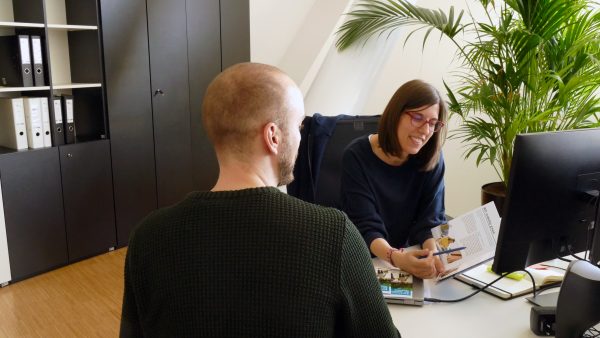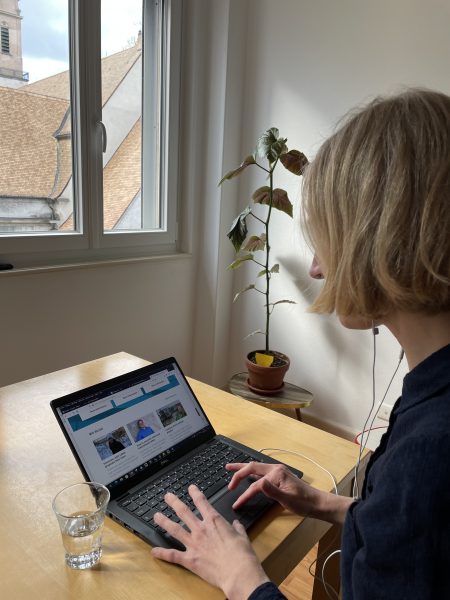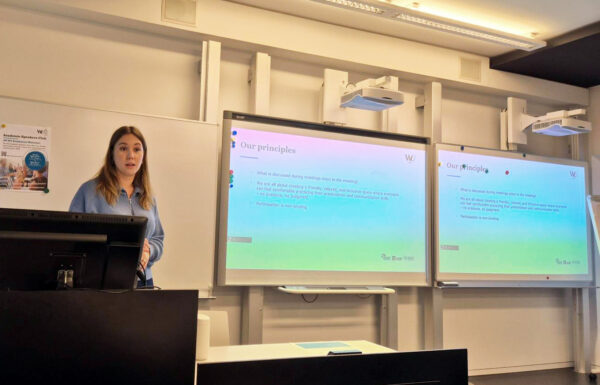Can women really have it all?
Twice the effort, half the credit? For many women, assuming a leadership position means making considerable sacrifices, especially for those who strive to succeed in highly competitive fields AND have a family. What role does the help of communities play, and is it time to reframe the meaning of success? These questions were discussed at the “WU matters. WU talks.” event on April 9.
In her opening lecture, Edeltraud Hanappi-Egger, the former Rector of WU Vienna and current Vice President of the soccer club SK Rapid, presented facts and statistics about the current situation of women worldwide, focusing on their happiness levels. “The statistics of the World Happiness Report include several factors: health, time balance, community, social support, education, arts and culture, environment, governance, material well-being, and work. The question is: what do we focus on when we’re asking if women can really have it all?” Hanappi-Egger explained.
According to several statistics, men profit more from how the world around us is structured – they earn more money in the workplace, they have a lower risk of poverty, and overall, men have more time on hand for social activities and leisure. Meanwhile, women worldwide are suffering from a situation where they are torn between their work and family duties, often neglecting their own social activities and leisure needs. So the question should also be: What does work-life balance mean for women, and how can women build more confidence and also stronger communities to overcome these obstacles?

An internalized bias against women
We all know what the glass ceiling is, but there’s also a glass filter – what does this mean? Many men and women have internalized biases, which means that the skills that are needed to be a traditional manager – such as an aggressive negotiation style, team leadership, making unpopular decisions, etc. – are genuinely perceived as masculine skills. This means that men are perceived to be more “authentic” when it comes to engaging in these kinds of behaviors. For women in management positions, this often results in double binds: they are expected to act and think like male managers, but when they do, they are punished for not being “feminine” enough in their behavior. And if women try to follow a different style of leadership, it is not appreciated in the workplace either, as Hanappi-Egger pointed out.
 Valerie Croy-Markones, Bettina Fuhrmann, Beate Natmessnig and Sanela Terko on the panel.
Valerie Croy-Markones, Bettina Fuhrmann, Beate Natmessnig and Sanela Terko on the panel.
Valerie Croy-Markones, head of CIB Client Management, Raiffeisen Bank International AG, confirms this analysis. “The Austrian banking industry still has a long way to go when it comes to higher management positions for women. The situation is already quite different in CEE countries, where more women are in leadership positions. Austria, on the other hand, is still very traditional. We may think we’re an advanced country, but in the end we often live by the traditional ways – men go to work, women stay at home with the kids,” Croy-Markones said.
To fight these biases and move forward, it is crucial for young women to have role models. “It’s a very difficult but important task: We have to show girls and young women all the options, all their opportunities, and actively enable and encourage them to choose wisely. Probably, no woman can have it all. The secret lies in finding out what is important to you and then have the courage to follow through,” states Bettina Fuhrmann, head of the WU Institute for Business Education.
What does success mean?
This also leads to the question: What exactly does success mean? “We have to change the way we think about success. It’s not about the working hours, it’s about the impact you have. If you have a fulfilling job, this also makes you a better friend, a better mother, etc. We all only have one life, and work is a part of it. We should be able to be happy without feeling guilty. When you’re working, you should not feel guilty for not being with your children, and vice versa,” said Sanela Terko, a tax consultant and partner at BDO, arguing her position.

Learn to say no and be confident
As a woman in a senior management position, it is crucial to “have trust in your team – you have to make compromises, and it’s important to turn off the phone every once in a while”, said Beate Natmessnig, general manager of commercial operations in Austria at CSL Behring GmbH. Sanela Terko added, “Sometimes saying no is an opportunity – you have to trust in yourself and your own decisions. Saying no makes you more confident.”
A good way for women to build up confidence is to focus on one’s individual sense of purpose, said Natmessnig. “For me, having it all never meant doing it all by myself. I need to have a clear purpose in my career, but at the same time, spending time with my family and friends is also a purpose in my life. I had to learn – sometimes the hard way – to ask for help when I needed it. And that would also be my advice for girls and young women: build your own network, ask for help, and don’t be ashamed to demand support from others,” Natmessnig pointed out.
Do you also want to have your say on the hot topics of our time?
“WU matters. WU talks.” is a regular series of panel discussions and public lectures where academics, and experts from the business world and key institutions share their expertise and discuss current topics together with the interested public. Click here to sign up for our newsletter to make sure you don’t miss any hot topics!























